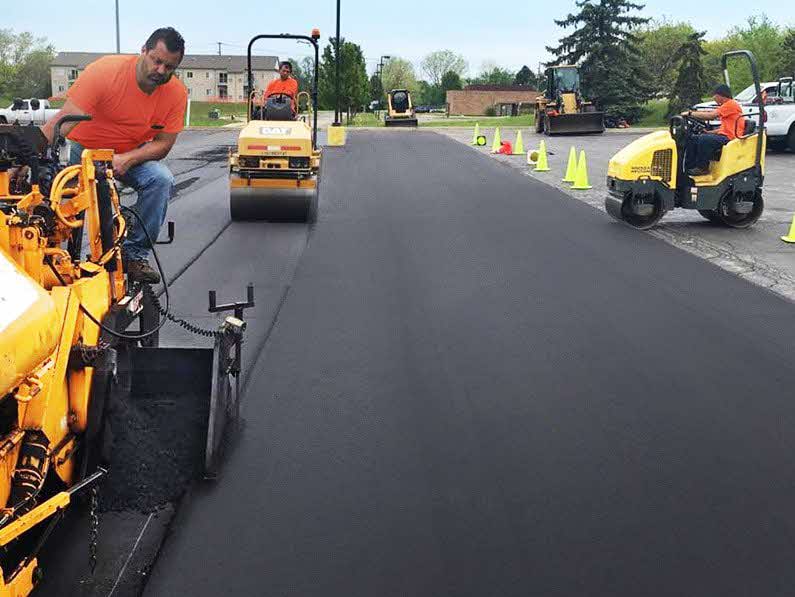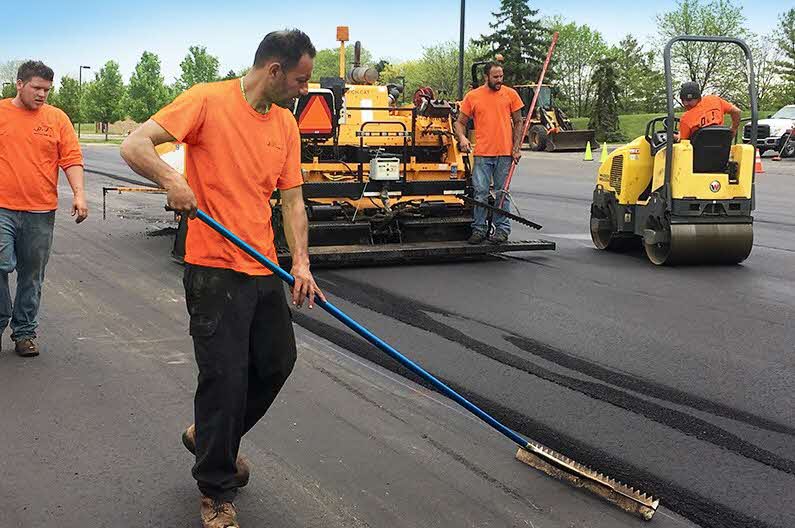Asphalt Paving Utica Michigan
We Are Locally Owned
& Operated For 36 Years
Contact Us Today!
About Asphalt Paving
Introduction
The world of commercial properties is riddled with processes designed to ensure their longevity, functionality, and aesthetics. One primary process that stands out in this perspective is Asphalt Paving. With a range of benefits, this process has grown in popularity and demand across various spheres. Therefore, it is fundamental for individuals associated with commercial properties to understand the intricacies involved in asphalt paving – which can only be achieved with the right information, guidance, practical tips, and the assistance of asphalt paving contractors.
The Process of Asphalt Paving
Asphalt paving denotes the use of asphalt to create smooth, robust surfaces for commercial properties like office parking lots, pathways, play areas, and more. When you search for “asphalt paving near me,” you come across numerous companies ready to assist you in paving your property with asphalt. It is a process that involves a series of steps that are designed to enable the absorption of vertical stresses in a horizontal manner.
The process begins with the thorough cleaning and preparation of the surface that is to be paved. Any debris or residue is thoroughly removed to make the surface smooth. The asphalt paving contractors then apply a layer of binder or primer, which helps create a strong bond between the asphalt and the base. The hot asphalt mix is then spread across the surface, followed by compacting this hot mix using heavy rollers. Contractors then ensure that the pavement is even, smooth, and free of any discrepancies or imperfections.
Benefits of Asphalt Paving
Asphalt paving companies offer a slew of benefits that make this process widely popular among commercial property owners. Whether you seek asphalt paving co near me or elsewhere, the advantages you attain remain consistent.
The undeniable durability and longevity of asphalt pavements stand as a primary benefit. Asphalt surfaces can resist an array of climatic conditions, heavy load, and more, making them perfect for commercial use. Owners of commercial properties often look for cost-effective solutions, and asphalt paving cost per sq ft is economical compared with other types of paving methods.
Resilience is another core advantage of asphalt paving assuring minimal maintenance, thereby decreasing the overall cost and efforts employed in preserving your commercial property.
Why Choose Professional Asphalt Paving Services?
A significant number of residential asphalt paving contractors are also skilled in handling commercial projects in the region. The selection of quality asphalt paving services comes with numerous benefits for your commercial property. These professionals hold expertise in handling the job perfectly, eliminating the trouble of frequent repairs or surface issues.
The professional touch and precision in their job ensures higher durability of the asphalt surface, making it worth every penny invested. They are also equipped to offer tailor-made services to suit the unique requirements of different commercial properties, making them the ideal choice for such tasks.
Conclusion
In conclusion, when you search for “asphalt paving companies near me,” you’re not just hiring a service to pave your commercial property. Instead, you’re investing in its durability, aesthetics, and functionality. So whether you are seeking to enhance the longevity of your property or seeking a cost-effective paving solution, understanding the process and benefits of asphalt paving is crucial.
As a commercial property owner, every decision you make plays a crucial role in the performance and durability of your property. Therefore, the importance of selecting experienced and proficient asphalt paving contractors cannot be overstated. Consider the tips shared in this guide and select only high-quality asphalt paving services to ensure the best results for your commercial properties.
For unmatched quality and results, reach out to us today for all your Asphalt Paving needs. We assure you one of the best professional asphalt paving services with the greatest attention to detail, delivering exceptional results.
Contact Us Today for a FREE
Asphalt Paving Quote






About Utica, Michigan
History
The city now known as Utica was platted by Joseph Stead in 1829, who named it “Harlow”. Others referred to the community as “Hog’s Hollow” or “McDougalville”, until a few years later it was named “Utica” by settlers from New York, in honor of the city of the same name in that state. This was common of settlers in this region, and is reflected in the names of nearby cities such as Rochester, Troy, and Livonia that are also named for New York cities.
By the 1940s, Utica was the center of a region of dairy farms and truck gardens. It had a flour mill and shipped rhubarb. Dodge Park a few miles south on the Clinton River was a state park.
As the 1950s progressed, Detroit auto companies began to build factories in neighboring Sterling and Shelby Townships, and the surrounding area began a transformation to an industrial economy.
Utica boasts a small historic district centered on Cass Avenue and Auburn Road, but few of the buildings predate 1906, due to destructive fires in 1905 and 1906.
Geography
Utica is in western Macomb County, bordered to the south by the city of Sterling Heights and to the north by Shelby Charter Township. Highways M-53 and M-59 serve the city. M-53 crosses the east side of the city, leading north 13 miles (21 km) to Romeo and south 8 miles (13 km) to Warren, while M-59 runs along the southern border of the city, leading east 8 miles (13 km) to Interstate 94 and west 15 miles (24 km) to Pontiac. Downtown Detroit is 21 miles (34 km) to the south.
According to the U.S. Census Bureau, Utica has a total area of 1.78 square miles (4.61 km), of which 0.02 square miles (0.05 km2) are water. The Clinton River passes through the center of the city, flowing southeast and then east to Lake St. Clair.
Demographics
| Census | Pop. | Note | %± |
|---|---|---|---|
| 1880 | 493 | — | |
| 1890 | 563 | 14.2% | |
| 1900 | 562 | −0.2% | |
| 1910 | 496 | −11.7% | |
| 1920 | 588 | 18.5% | |
| 1930 | 873 | 48.5% | |
| 1940 | 1,022 | 17.1% | |
| 1950 | 1,196 | 17.0% | |
| 1960 | 1,454 | 21.6% | |
| 1970 | 3,504 | 141.0% | |
| 1980 | 5,282 | 50.7% | |
| 1990 | 5,081 | −3.8% | |
| 2000 | 4,577 | −9.9% | |
| 2010 | 4,757 | 3.9% | |
| 2020 | 5,245 | 10.3% | |
| U.S. Decennial Census | |||
2010 census
As of the census of 2010, there were 4,757 people, 2,218 households, and 1,245 families living in the city. The population density was 2,781.9 inhabitants per square mile (1,074.1/km2). There were 2,463 housing units at an average density of 1,440.4 per square mile (556.1/km). The racial makeup of the city was 90.4% White, 1.9% African American, 0.5% Native American, 3.5% Asian, 1.9% from other races, and 1.8% from two or more races. Hispanic or Latino of any race were 3.8% of the population.
There were 2,218 households, of which 23.6% had children under the age of 18 living with them, 37.8% were married couples living together, 14.0% had a female householder with no husband present, 4.3% had a male householder with no wife present, and 43.9% were non-families. 38.0% of all households were made up of individuals, and 15.9% had someone living alone who was 65 years of age or older. The average household size was 2.13 and the average family size was 2.80.
The median age in the city was 41.7 years. 17.9% of residents were under the age of 18; 8.8% were between the ages of 18 and 24; 27.4% were from 25 to 44; 28.3% were from 45 to 64; and 17.4% were 65 years of age or older. The gender makeup of the city was 47.4% male and 52.6% female.
2000 census
As of the census of 2000, there were 4,577 people, 1,952 households, and 1,184 families living in the city. The population density was 2,578.2 inhabitants per square mile (995.4/km2). There were 2,005 housing units at an average density of 1,129.4 per square mile (436.1/km). The racial makeup of the city was 93.77% White, 0.92% African American, 0.37% Native American, 2.56% Asian, 0.74% from other races, and 1.64% from two or more races. Hispanic or Latino of any race were 2.10% of the population.
There were 1,952 households, out of which 27.2% had children under the age of 18 living with them, 43.8% were married couples living together, 13.3% had a female householder with no husband present, and 39.3% were non-families. 34.2% of all households were made up of individuals, and 10.8% had someone living alone who was 65 years of age or older. The average household size was 2.29 and the average family size was 2.96.
In the city, the population dispersal was 21.0% under the age of 18, 9.6% from 18 to 24, 31.7% from 25 to 44, 23.2% from 45 to 64, and 14.5% who were 65 years of age or older. The median age was 37 years. For every 100 females, there were 92.9 males. For every 100 females age 18 and over, there were 91.8 males.
The median income for a household in the city was $38,683, and the median income for a family was $57,156. Males had a median income of $36,912 versus $26,353 for females. The per capita income for the city was $21,615. About 4.8% of families and 7.0% of the population were below the poverty line, including 6.7% of those under age 18 and 17.3% of those age 65 or over.
Education
Utica Community Schools operates public schools, including Utica High School, Eppler Junior High School Flickinger Elementary School, and Wiley Elementary School. They serve the communities of Sterling Heights, Utica, and Shelby Township.
Contact Us Today for a FREE
Asphalt Paving Quote
Our Asphalt Paving services are available in Utica as well as all of Macomb County.
Our dedicated team at D&J Contracting Inc is at-the-ready to provide you with great customer service and first class Asphalt Paving services. Reach out to us at (586) 954-0008 to discuss your Asphalt Paving needs today!